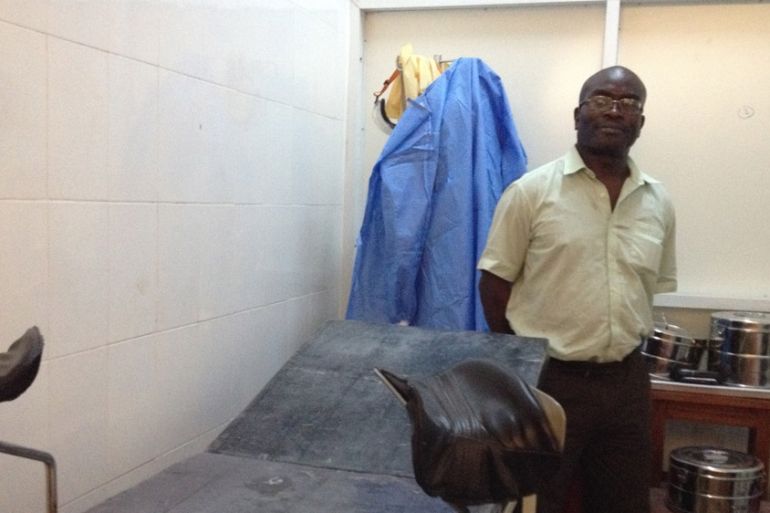The women dying for an abortion in Sierra Leone
“She died in front of my office door. Her head just slumped back in her wheelchair. She was 24 years old.”

Freetown, Sierra Leone – When 20-year-old Memunatu Kamara fell pregnant, she wasn’t sure what to do. She knew she wanted to concentrate on her education, but abortion is illegal in Sierra Leone.
So she went to see a traditional practitioner who she believed would help her end the pregnancy.
Keep reading
list of 4 itemsPoland lawmakers take steps towards liberalising abortion laws
Polish lawmakers debate reforming strict abortion laws
Why has Arizona re-enacted a 160-year-old abortion ban?
She was instructed to drink a sour green concoction.
Shortly afterwards, the bleeding began.
“I was so scared and was afraid to tell anyone,” she remembers. “I felt so so sick … so bad.”
When her older sister found her crawling around on the floor bleeding and in unbearable pain, she took her straight to hospital. They arrived just in time and a safe post-abortion procedure was performed.
Kamara was one of the lucky ones. Many other women and girls who visit traditional practitioners for what are commonly called “backstreet abortions”, aren’t so fortunate.
“Unsafe abortion is a major issue in Sierra Leone – one that accounts for an estimated 10 percent of maternal deaths in public hospitals,” says Janie Benson, the vice president of research and evaluation at IPAS, a global organisation working to end preventable deaths and disabilities as a result of unsafe abortions.
“Many more women are unable to seek care in health facilities and die in their communities or suffer short or long-term morbidity,” she continues.
Kamara’s boyfriend of several months had refused to wear a condom, and she hadn’t known about the birth control pill, but many others end up pregnant as a result of rape.
Anne Marie-Caulkner was raped when she was 16. When she discovered she was pregnant, she found a nurse who gave her an injection that was supposed to help her abort the foetus.
“It affected me for a whole month,” she says, describing the pain. “I thought I was going to die. There was so much blood, and this baby was in me – dead. I wanted to die.”
That was decades ago and Caulkner says she still faces irregular periods which she believes are a side effect of the abortion.
Sexual violence against women
During the recent Ebola crisis in Sierra Leone, sexual violence against women and girls increased as, for example, girls were kept out of school or those who had lost parents became more vulnerable to abuse. This led to a resulting increase in teenage pregnancies.
Arlene Omo-Liska is an activist for women’s rights who works for IPAS in Sierra Leone’s capital, Freetown.

She says some women and girls try to conduct abortions themselves – sometimes by inserting the straightened top of a coat hanger into their cervix.
“Or sometimes they will stand from a high point and fall to put pressure on the foetus,” she explains. “Or they will lie on the floor and invite someone to jump on their stomach because that pressure can cause the foetus to go. Sometimes it works, sometimes it doesn’t, and then they tell them [to] jump harder.”
She says young women are dying as a result of unsafe abortions and safe services need to be introduced in order to avoid such deaths.
The country’s president, Ernest Bai Koroma, came close to signing off an abortion bill last December. It would have allowed pregnancies to be terminated under any circumstances up to 12 weeks’ gestation and up to 24 weeks in cases of incest, rape, foetal impairment and when the woman’s health is at risk.
The bill passed through Sierra Leone’s parliament, but religious leaders raised objections. After further discussion in parliament, the bill was presented to the president in March but was once again rejected.
Martha Chigozie, a reverend with the Inter-Religious Council in Sierra Leone, does not want to see the bill passed, believing abortion to be unethical.
“You don’t know what’s going to happen [to that life],” she says. “And for those conceived in a negative way, like rape, they still can become somebody. You are destroying a life; you don’t know who that person will become.”
Chigozie says that instead of legalising abortion, the government should introduce stricter punishments for rape. The country’s Sexual Offences Act currently prescribes five to 15-year prison sentences for rape. But Chigozie thinks that increasing those terms might lead to a decrease in rape cases.
The reverend would also like to see a greater emphasis placed on educating the young about safe sex.
She died in front of my office door. Her head just slumped back in her wheelchair. She was 24 years old.
Sheikh Abu Bakarr Conteh is the president of the Inter-Religious Council. He believes the proposed bill fails to adequately consider the rights of a woman’s sexual partner, particularly when that woman is married. He would like to see a woman get the consent of her family before having an abortion in order “to maintain peace”.
‘She died in front of my office door’
Sierra Leone has one of the highest maternal mortality rates in the world, with 1,360 deaths per 100,000 live births in 2015.
According to the World Health Organization and the nonprofit Guttmacher Institute, nearly half of abortions worldwide are unsafe, and about 98 percent happen in the developing world.
The United Nations and African Commission on Human and Peoples’ Rights (ACHPR) has asked Sierra Leone “to respect its obligations under international and regional human rights law by ensuring access to sexual and reproductive health and rights for women, including maternal healthcare and access to all methods of contraception”.
The ACHPR has also launched a campaign asking those African countries that haven’t already done so to decriminalise abortion.
Dr Rowland Taylor is an obstetrician gynaecologist at the Princess Christian Maternity Hospital, in Freetown.
He says that, on average, two women a week come in to see him with complications resulting from an unsafe abortion.
Treating post-abortion complications can be expensive, he says, particularly in the most severe cases.
In contrast, he says, safe abortions using manual vacuum aspiration can be a relatively simple procedure once somebody is trained in the method.
One of the main side effects women experience after an unsafe abortion is bleeding. Parts of the foetus are often left in the uterus. Sometimes, Taylor says, he has to open the abdominal cavity due to infection and some complications can even lead to infertility.
It is, he stresses, a public health issue that has nothing to do with religion or ethics.
He recalls one nursing student who came in after an unsafe abortion.
“She was bleeding from her vagina and the blood was black,” the doctor recalls.
“That’s the first time I’ve ever seen someone bleeding with the blood black. She died in front of my office door. Her head just slumped back in her wheelchair. She was 24 years old.”